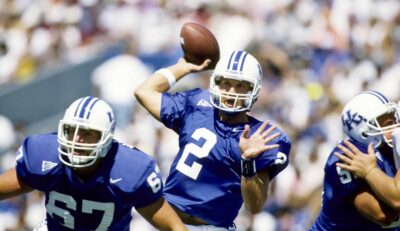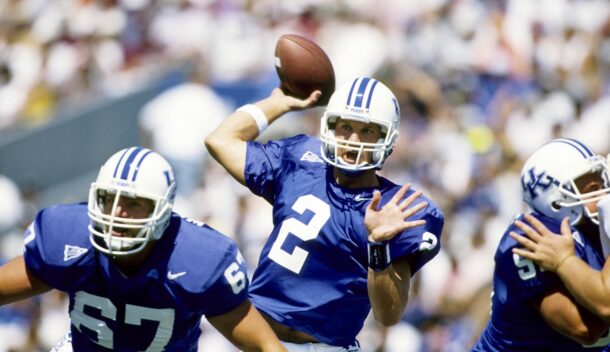
It ain’t over, but Ole Miss’ 3-punch combo on Oklahoma felt like a national championship-level knockout
Good morning, good afternoon, goodnight.
That’s what Game 1 of the College World Series final felt like. Ole Miss delivered a 3-punch combination on Oklahoma that, dare I say, had a knockout feel to it.
Hitting back-to-back-to-back jacks will give off that sort of vibe.
Relax, Rebs fans. Don’t throw your beer at me for jumping the gun (I’m fully aware that 5 of the last 6 champs lost Game 1). Save that for the home runs, of which, there were many by the team in navy on Saturday night at Charles Schwab Field.
Let’s just say that Ole Miss’ 10-3 victory on Saturday night was a monumental step toward the program’s first national championship in a best-of-3 College World Series final.
Duh. That’s the way Game 1 always works, guy. Why is this year any different?
Well, let’s consider who Ole Miss had on the bump. It wasn’t ace Dylan DeLucia, who was masterful in the semifinal elimination game against Arkansas but was unavailable 2 days later. It wasn’t sensational freshman southpaw Hunter Elliott, who allowed 1 run in 6 1/3 innings of work in Ole Miss’ win against the Hogs on Monday.
Nope. On the bump was Jack Dougherty. You know, the guy who hadn’t started a game in 3 months.
Naturally, he became the first College World Series final pitcher to ever set down the first 11 batters. Of course Dougherty was perfect heading into the 6th inning. Like, the guy who entered with an ERA north of 5.00 and got his 4th start of the season. Why did he get the ball? Ole Miss coach Mike Bianco said that without DeLucia or Elliott available, Ole Miss wanted someone who would “fill up the strike zone.”
Needless to say, Dougherty did just that.
Of his 72 pitches, 50 were strikes. To be fair, he was riding a streak of 12 consecutive scoreless innings, so it wasn’t a total shot-in-the-dark move from Bianco. Whether he was tying up future early-round MLB Draft pick Peyton Graham on a nasty breaking ball or making a kick save on a line drive at his foot, seemingly everything Dougherty did worked. On a night when anything beyond 3 innings probably would’ve been considered a massive win to preserve Ole Miss’ bullpen, Dougherty got into the 6th inning before Oklahoma started to mount its best threat of the night.
But just as it has all postseason, Ole Miss squashed that. Bases loaded for Graham wasn’t too daunting for freshman reliever Mason Nichols. Two consecutive strikeouts, a walk and a weak groundout back to the mount kept the Ole Miss lead at 4-2. Instead of watching Dougherty’s start go to waste, the gap only widened in the later innings once the Rebel bats got going.
Wait, so why was the victory a 3-punch combo?
Ole Miss came out with a jab in the opening round that Oklahoma, who last played on Wednesday, wasn’t ready to handle. Oklahoma ace Jake Bennett had 3 wild pitches in the first 2 innings alone. The normally sure-handed Oklahoma defense was anything but that. An Ole Miss team who entered Saturday having scored 10 of its 22 CWS runs with 2 outs continued that trend with each of its first 3 runs.
Speaking of trends, Tim Elko doing Tim Elko things continued when he left the yard with an opposite field bomb to give Ole Miss a 4-0 lead.
Tim Elko packed A Game for “OLEMaha” @NextRoundLive pic.twitter.com/RhIs1TKhxj
— Jim Dunaway (@jimdunaway) June 26, 2022
Tell me that celebration didn’t look like Swayze Field West.
Was that a knockout? Eh, a 4-0 lead was probably more of a jab with how well the Sooners had been swinging the bats in the NCAA Tournament. The fact that teams were 11-2 in this year’s CWS after scoring the first run didn’t guarantee much of anything, but seeing the Sooners trail for the first time was certainly a punch landed.
If that was the jab, what Nichols did in relief of Dougherty was the hook. And yes, that was partially in reference to him throwing 7 consecutive sliders with the bases loaded. It worked.
Another punch landed.
But the uppercut was what happened in the top of the 8th inning. It was a 3-punch combination in itself.
Insurance runs are cool. You know what’s way cooler than that? Three consecutive home runs in Game 1 of a national championship series. TJ McCants, Calvin Harris and Justin Bench did that. As in, Ole Miss’ 8-hole hitter, 9-hole hitter and leadoff man all went deep in consecutive at-bats.
Ole Miss fans didn’t have any beverages left to toss by the end of the madness:
THREE-STRAIGHT JACKS!!!@OleMissBSB is the first team to hit back-to-back-to-back homers in a #MCWS game since 1998 😤 pic.twitter.com/vPxRT69hby
— ESPN (@espn) June 26, 2022
And that, folks, is your haymaker to the jugular.
Oklahoma was out for the count after that, and understandably so. Ole Miss showed up on Saturday with bad intentions. To be fair, it did that the entire postseason after nearly missing the NCAA Tournament altogether. Continuing that against an Oklahoma team who was +50 in run differential in the postseason felt … significant.
Whether that results in a national title remains to be seen. But considering how well that set up the Ole Miss pitching staff, it’s hard not to be optimistic about the Rebs’ chances after that Game 1 statement.
On the mound on Sunday afternoon will be the aforementioned Elliott, who has been a massive part of Ole Miss’ well-documented midseason turnaround. Go figure that the last time Dougherty started in that blowout loss to Tennessee back in March, Elliott was being used as a long reliever. Much has changed since then. Ole Miss won each of his last 6 starts, only 1 of which saw him allow multiple earned runs. So far in the postseason, he surrendered 2 earned runs in 18 2/3 innings.
Now, the baby-faced freshman that Bianco says “hasn’t even broke out a razor yet” is tasked with helping lead Ole Miss to history. No big deal. Perhaps by Sunday night, he’ll have made his brilliance look like no big deal once again.
The rally cry associated with Ole Miss after squeaking into the NCAA Tournament was “don’t let the Rebs get hot.”
The Rebs have been hot for some time now. There might be anything Oklahoma can do to cool them down.
Eating punches won’t do the trick.
Connor O'Gara is the senior national columnist for Saturday Down South. He's a member of the Football Writers Association of America. After spending his entire life living in B1G country, he moved to the South in 2015.







